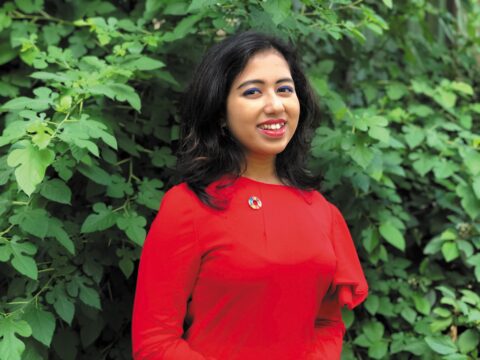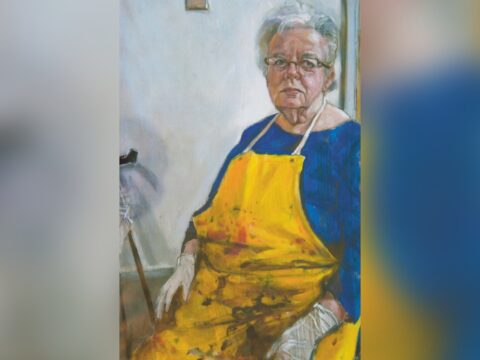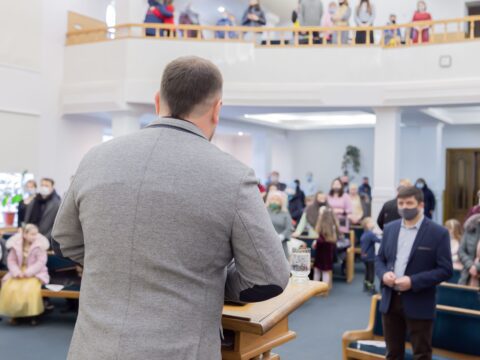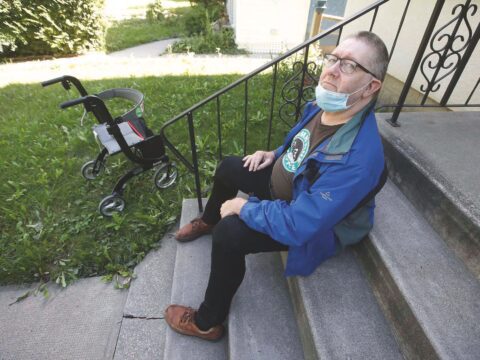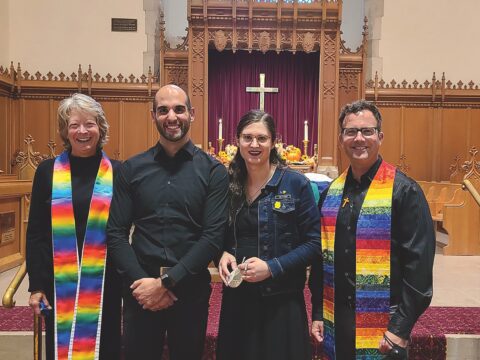About 2.5 percent of Vancouver’s population is Indigenous. But in the Downtown East Side (DTES) — where residents face challenges including poverty, mental health issues, addictions, the ongoing opioid crisis and homelessness driven by a lack of affordable and safe housing — the numbers are much higher. Up to 40 percent of area residents and up to 60 percent of those seeking spiritual care at the First United Church Community Ministry Society are Indigenous.
When Carmen Lansdowne, a member of the Heiltsuk First Nation, became First United’s executive director five years ago, she wanted to make their needs a priority. “Because Indigenous people are the most marginalized here, we need to centre their experience in our planning,” she says. “We’re unapologetic about that.” At the heart of this effort is an Indigenous-led and Indigenous-focused spiritual care team, of which she is one member. The spiritual team’s work emanates throughout the entire culture of First United and makes this a safe space for Indigenous people.
You may unsubscribe from any of our newsletters at any time.
First United has a long history of commitment to social service here. It has been an active presence since its establishment as First Presbyterian Church in 1885, evolving from a pioneer congregation to city mission to its current combination of service provision and advocacy.
Today, it operates a 60-bed transitional shelter (with capacity reduced to 40 during COVID-19), and through its sister organization, First United Church Social Housing Society, manages 189 units of affordable housing. Over the years, First United has worked to meet the evolving needs of its community.
It’s always a busy place. Three hundred people get their mail here, and countless others rely on it for a place to take a shower, use the phone, consult with an advocacy worker or get their income tax return done. Community members may come to lounge in the drop-in area, attend Spirit Circle, get a meal, pick up harm-reduction supplies or get out of the rain.
The pandemic has changed the scene, but the work continues. The 10,000 meals served each month have been switched to takeout service. Capacity at the shelter has been reduced for safety, but legal advocacy and helping people search for permanent housing continue.
In the midst of all these activities, Lansdowne and the other two members of the spiritual leadership team create programming and care for First United’s Indigenous community members.
Cheryl Bear, a member of the Nadleh Whut’en First Nation, is director of community ministry. She’s responsible for the overall planning of spiritual care and social justice programs. She also does ecumenical bridge-building with other communities of faith in the DTES, as well as teaching and outreach about Indigenous spirituality to other groups. Lauren Sanders, Indigenous spiritual care chaplain and a member of Prairie Band Potawatomi and Kickapoo Nation of Kansas, rounds out the team, co-ordinating the regular Spirit Circles, much like spiritual care discussion groups.
Bear and Sanders provide pastoral care to staff and to shelter and neighbourhood residents. They conduct memorial services on request, and plan events like the comfort retreat, which offers an opportunity for day school and residential school survivors, with their support people, to begin healing and to have their value and identity reinforced.
Their work also influences the way all programming is delivered at First United. For example, of approximately 65 full-time-equivalent staff positions, Lansdowne says 15 to 20 percent of staff members are Indigenous. This matters, she says, because “there is a really deep need for strong cultural sensitivity. It’s so easy to re-trigger trauma, whether it’s personal, systemic or intergenerational.” While Canada is home to more than 500 different Indigenous peoples, Lansdowne explains, “our world views had more in common with each other than with Euro-Christian views. There’s the shared experience of colonization, and we have held on to the protocols of how we relate to each other. It’s not so much common practice as shared experience.”
“People come here with trauma all over their body and want a place to sleep or just sit. They keep coming back, and they seem to leave with a little less burden on their shoulders.”
“It’s quite refreshing to come to work and be able to talk about my life in an Indigenous way, and not have to frame it into a dominant culture context,” Sanders says. With both co-workers and members of the community, “we’re able to communicate without having to preface or explain, and then we hear that back. It builds community and trust.” Community members definitely feel more comfortable because they don’t have to code-switch to fit in at First United, she says, meaning they don’t have to change their natural habits and instincts to match those of the dominant culture.
“What we hope for is understanding of our trauma. That’s a large ask; it goes against everything the dominant culture understands,” she adds. When unmarked graves were first detected last year at the former Kamloops Residential School site, for example, residents knew they could come to grieve with others without having to justify their reactions.
Indigenous people need a safe place to sit, laugh and cry together, the team says, so they can begin healing and rebuilding their Indigenous identities with Indigenous healers walking alongside them. They find it at First United, through the regular Spirit Circles, individual pastoral care and an overall environment of understanding and support. “People come in here with trauma all over their body and want a place to sleep or just sit,” Sanders says. “They keep coming back and asking if they can do things we see as healing — art, feeling watched over, crying, yelling, sharing coffee or tea, or just wanting to say, ‘I don’t want to say a thing to you today.’ But they seem to leave with a little less burden on their shoulders.”
Investing in Indigenous healing spaces benefits everyone, she adds. “Whether it’s at a workplace or a church, it helps all of us understand that we are all impacted by trauma. This individualism to the point of each being our own island is not good; it’s isolating and fosters more trauma. It makes us not human, and we need to learn to humanize one another.”
George Flett is the shelter manager for the ministry society. “First has really flipped the switch” with its emphasis on Indigenous leadership and staff, he says. “Even for someone who’s coming into the shelter, there are rules set up to protect people in the culture we live in, but when you think of the complexity of Indigenous family relationships, you can’t use the same formula you’d use for the mainstream population.” For example, he says, in Indigenous communities, you never knock before entering the home of a family member, but his Caucasian partner thinks it’s strange not to knock or to call ahead. Because it has Indigenous leadership, the staff at the shelter understand these kinds of dynamics.
A member of the Saulteaux Nation, Flett grew up in East Vancouver with addicted parents and understands the importance of building trust between service providers and community members. “Sometimes people here expect to be treated badly so they respond that way — it’s part of their protective armour. Trust only comes with time put in, showing people you’re there for the right reasons.” After working there for 12 years, he adds, “I do love this community. My heart is here.”
More on Broadview:
- How an Indigenous Peoples Fund would actively further reconciliation
- Rebecca Kudloo is fighting for a violence-free future for Inuit families
- At 1JustCity, Indigenous peoples — and settlers — come to heal in a safe space
After four years of community consultation, First United is currently raising $30 million toward construction of a new building at its current location at the corner of East Hastings Street and Gore Avenue. It’s moved its many services and its shelter to several satellite locations around the neighbourhood during the interim, and obtained special approval for a food truck to give away meals.
The new facility will provide First United with four floors of space for its programming — three times what it had in the old building — while the Lu’ma Native Housing Society will operate more than 100 below-market housing units for Indigenous people on the upper seven floors. The housing area will include a medicine garden and a sacred circle.
“We aren’t just building a new building,” says Lansdowne. “We’re building a place where people can connect and heal.”
Reconciliation calls for even more tangible action, she adds. “The justice issues are still relevant — there are still a disproportionate number of Indigenous children in care; poverty is worse in Indigenous communities. It’s not in the past.”
And because the spiritual team deeply understands that, many DTES residents regard First United as a safe haven. Since it’s a low-barrier facility and staff don’t ask a lot of questions when people come in, it’s difficult to collect hard data on the team’s impact — but they can see the difference they’re making. “A lot of people thank us for providing a culturally safe space in the community,” Lansdowne says, “and for modelling reconciliation to the rest of the church.”
***
This story first appeared in Broadview’s March 2022 issue with the title “Safe space.”
Nancy Painter is a writer in Surrey, B.C.









